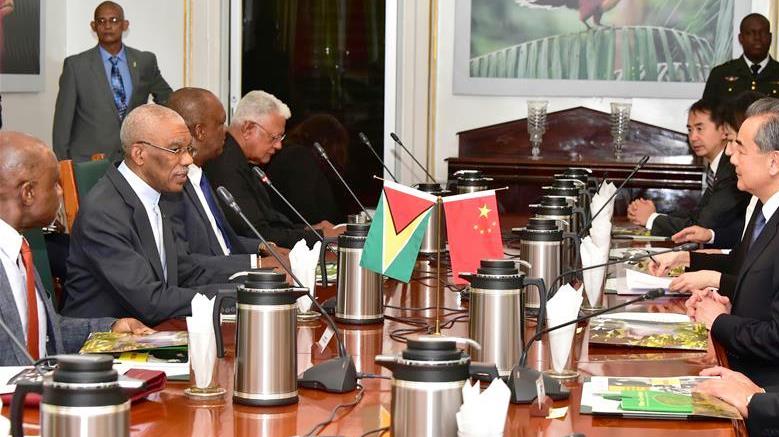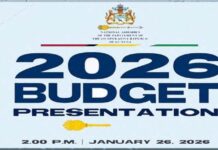REPUBLISHED- We still don’t know what land leases foreign vendors have in our country. We need to know how much of our 83000 square miles are still ours.
Looking, as cautious people are disinclined to do, on the bright side when reading an OP ED from the Opposition, the opening salvo of this analysis on the MOU sort of justifies our hesitation; though it wouldn’t stifle a response, even if our better angels were on duty.
The columnist, a well-known political transigent, has become the master of PPP ventriloquism; channeling the voice of a knavish Party Leader through a lexicon of invectives that tend to fizzle and diffuse amongst themselves. There was a time when political tongue-lashing was a delicious stewing of the opponent; delivered with a select combination of parts of speech. That’s when the invective was an art. Now it’s just a blind stabbing of loosely connected remarks inartfully delivered and with no punch line….
It’s not like it’s open season on Dr. Jeffrey at all but he does seem to be the only scribe from the PPP corner that manages to aggregate language in readable enough form to produce enough substance to extract the general gist of his thoughts.
I was cautioned a few weeks ago about ascribing “fabled intellect” to Dr. Jeffery…. to which I responded let sleeping fables lie, mostly because I’m a romantic and would be shattered if I had to be rewired to accept him as anything other than a role he has been grandfathered into.
Our heroes are made for us.
Let’s take his OPED for all the reasons I outline above.
It’s the stuff of headlines and political point scoring but the packaging somehow doesn’t ride the rhythm to smooth storytelling. Reading like a tumultuous Shakespearean rendition in which daggers are drawn, poison is ingested and everyone is in renegade mode, there is a scurrying to marry what seems to be cut and paste points that never connect the title to its substance.
Then, with arresting unsubtlety, the writer drops his thesis, “Today I want to consider the background of the concerns that were raised over the signing of the China Road and Belt Initiative MOU between the governments of Guyana and China to see if there are any lessons for Guyana.”
Just like that!
Of course there’s no such background mentioned in any of the disconnected parts straining to tie his tale together but it did offer opportunity to examine some of what he cited….namely “Indeed, apart from providing good photo opportunities, MOUs are not legally binding and in themselves are neither good nor bad: it depends on how effectively they are managed”.
This misconstrued application of ceremony to the Memorandum Of Understanding (MOU), may be why Jeffrey signed multiples of dozens of these things with the Chinese during his stint as Foreign Trade and International Cooperation Minister.
Surely, the gratuitous award of a political Ministerialship is usually a governing travesty but there’s this thing about your reputation being your strongest asset that applies to those who accept public office…
By the time Jeffery became the nation’s designated signatory, the catechism of investment was China and its convoluted initiatives that blurred aid and loans for untold returns. Foreign Direct Investment offered the public alarming economy of detail. Curious folks, not hearing too much from Jeffrey, who was clearly smitten by the function of smiling and signing, decided to look more at China and its loans and its MOU’s and found that its reputation was several shades deeper than tarnished, amongst those emerging countries across Continents, particularly in Africa and South America.
And, some countries, like Sierra Leone ,were not only cancelling contracts and expelling China, but many were demanding a do over of contracts that were meant to be aid but morphed into loans and with pounds of flesh built in to repayment clauses.
Sri Lanka was unable to repay at the dictated rate in the MOU signed with China. China settled instead for a 99 year lease on their Sri Lanka’s strategic Hambantota Port- a point of trade that would benefit China exponentially.
That’s how economic thugs roll.
But because we’ve covered similar issues extensively in our previous publications on China, we’ll focus more on the MOU that is not as enamoring as Jeffery might suggest. Mr. Jeffrey’s declaration of “MOUs are not legally binding and in themselves are neither good nor bad: it depends on how effectively they are managed” is especially frightening, since our research offers the contrary.
What we’ve learned is that the MOU, as designed by China, states, very ostensibly, that the document is non-binding. Countries influenced by British and US laws, therefore, accept that ‘non binding’ appendage at face value and just assume that they are covered by the rule that prevails in England: no party is exposed to any liability during the negotiation period; liability arises only after the parties have executed a formal, written contract. Under this rule, if the written document clearly states that it is non-binding, no liability arises.
But not so, China.
The Contract Law of the People’s Republic of China, PRC, has formally adopted the German Law Principle of Liability for negligence in contracting. Contrary to the classic common law view of the United States and England, under this principle, parties to a contract owe one another a duty of good faith. In a case where negotiations have commenced but no contract is concluded, the party that caused the failure to contract can be liable to the other party for damages. The damages in this situation are not contract damages, but, rather, damages for compensation for loss resulting from the reasonable reliance of the damaged party on the conduct of the other.
Translation? The MOU is binding and intertwining in the eyes of the Chinese.
And the whole thing is embodied in Article 42 of the PRC Contract Law, which reads as follows: Article 42 Pre-Contract Liabilities…..pg 7/72.. which says, in essence, China reserves the right to consider any change, after the MOU is signed, as a negotiation that was done in bad faith, that the other party supplied false information that lured poor China into signing and that anything that doesn’t go in China’s favor will be interpreted as the deliberate violation of the principle of good faith.
More Translation?
Article 42 becomes the Catch 22.
And the MOU’s signed by the smiling Jefferey’s et al because they were perceived as toothless, non binding, photo opportunities, to spotlight the generosity of a benevolent China have cost the country in terms that should be shown to the citizens.
Guyanese deserve to know the details of the deals politicians have signed with China given its overtly stated mission of world domination through securing the rights of the world’s natural resources. And if the Government had nothing to hide, it would share with its people, what financial or burden of patrimony they carry for China.
It’s long been thought that China’s burgeoning presence in Guyana is not just a thing of strange happenstance. That the Guyana Government under the PPP evicted squatters from the land reputedly known to be the farm of Viola Burnham, along Mandela Avenue, to make room for a Chinese Embassy, that mainland Chinese are the growing class of Mom and Pop store owners and emerging businesses, that they flagrantly and with more malice than not, violate laws, business agreements and disrespect Guyanese laborers, are testaments to the power they know their dollars wield.
You would think that four decades and more of Chinese assistance and a mountainous accumulation of contracts and debt without corresponding improvement in the national economy would cause the governing architects to, at the very least, suspend business ventures with China until they recalibrate to see why Guyana is at the end of diminishing returns.
Multiples of scores of MOU’s were inherited from the 23 years of PPP government. The Coalition’s pledge in its Manifesto, under Foreign Relations “we will seek national consensus… “protecting national interest at home ….” reminds us of why we threw our support behind them.
So, imagine our surprise when the President announced, with a pandering kind of gusto, that he is “ready to work with China to turn bilateral consensus into actions by taking the opportunity of jointly building the Belt and Road”.
China has never really entered into anything bilateral. The language of bilateral and reciprocity are interchanged in their agreements in a deliberately clever way to take advantage of needy politicians, ambitious leaders of cash strapped countries with immeasurable natural resources. Their MOU’s are debt traps that make legal recourse via serving process/suing China is an exercise in impossibility. China has just recently become a member of the Hague to pretend that it is a due- process partner because of mounting accusations and multiple demands from countries that cite its rapacious and misleading contractual dealings.
A couple of things.
The governments of Guyana, particularly those from 1992, seem addicted to the short term incentives from China when they know the long-term goal of Beijing is to increase its global real estate. It’s a curious point that cannot be viewed outside of the established fact that China has a healthy appetite for bribing the leader of countries that stand between them and the natural resources they want.
We’re not accusing Guyanese leaders of receiving incentives that have not been processed through the treasury. We’re just juxtaposing China’s familiarity with the practice and Guyana’s inexplicable trade volume with them.
And, all things being equal, the failure of successive governments to address the omnipresence of China in Guyana and its economy seems not be a thing of unusual occurrence, either…with especial reference to the Coalition Government whose calling card was Integrity.
This all arches back to the MOU that politicians seem to have taken as a perfunctory precursor to China’s Shylock type financially engineered usury, disguised as largesse.
The quip, ‘writing isn’t just a slinging together of words’, needs a corollary that covers the Jeffrey’s, whose attempts often yield a treasure trove of unintended value.
Were it not for his pseudo –Orwellian attempt to make light of the MOU by blaming the Coalition Government for not making them “transparent enough” , with concurrent rebuke that they “only be used if absolutely necessary” , we would not have been curious enough to sift through the ingredients of his word salad.
His closing argument, “For decades, Guyana and China have had excellent relations and there is absolutely no reason why that should change” attests to the soupy politics of Jeffrey whose weekly columns may just be garnishing him some Jagdoean benfit.
Talk about operating by rote.
The term “decades” alone would suggest, to those less politically polarized, a revisitation of this old agreement to tweak for current application.
But we read these things for their unintended treasures, not for any intellectual inquiry.





